Professor Ann Hemingway and Dr Katey Collins will be sharing their latest research at a lunchtime seminar session on Wednesday (13th November). All are very welcome to attend. The session will run from 1:15 – 2:00 in B321, Bournemouth House. Please feel free to bring your lunch.
Tagged / research
Talk/session with the Wessex Clinical Research Network Study Support Service
The National Institute for Health Research (NIHR) is the nation’s largest funder of health and care research – the NIHR oversee 15 Clinical Research Networks (CRN) and these CRNs work alongside NHS Trusts, primary care providers and Universities. Each CRN has a dedicated Study Support Service.
The NIHR have a portfolio of research studies that are eligible for consideration for support from the CRN in England. Portfolio status is usually vital to participating NHS Trusts when considering undertaking a proposed study.
Information on the NIHR portfolio is present on the research blog, but at this session our local CRN’s Study Support team will provide you with an opportunity to hear about and discuss the network and the service, and how it could benefit you.
This session is aimed at those planning on conducting clinical research.
It is also designed to raise awareness at BU about the benefits and importance of the NIHR portfolio, so if you’re just interested in learning more, please book on.
The session will take place on Tuesday 10th December at 2:3opm until 4:00pm on Lansdowne Campus.
To register your interest or if you have any queries, please get in touch with Research Ethics.
Photo of the week: ‘A sense of place’
Telling a story of research through photography
The ‘photo of the week’ is a weekly series featuring photographs taken by BU academics and students for our Research Photography Competition which took place earlier this year.
These provide a snapshot into some of the incredible research taking place across the BU community.
This week’s photo of the week was taken by Dr Sue Baron and is titled;
‘A sense of place’
This image ‘A Sense of Place’ illustrates one of the many often unreported benefits of co-creation projects, where research outputs are achieved by BU staff, students and members of the public working together. An important part of being human is for us to feel a sense of place; not just in terms of our environment and objects but also through our experiences and the connections we make as these contribute to our sense of belonging, togetherness, comfort and security. Being aware of the importance of these factors is vital in research that seeks to investigate or report on human experience as was the aim of this project. This image captures the positive sense of place and togetherness which developed between two former strangers, Emma and Helen (L-R) through their engagement with this project. Helen has cerebral palsy and complex communication needs and has experienced many and varied challenges as a patient in hospital which she wanted to share.
Outputs from the project include a series of filmed interactions between a patient and nurse. An example can be viewed on Virtual Empathy Museum click on ‘Take a Walk in my Shoes’, Simulation Room and ‘Empathic care of a person with cerebral palsy e-simulation’. The photograph was taken on location in Helen’s home.
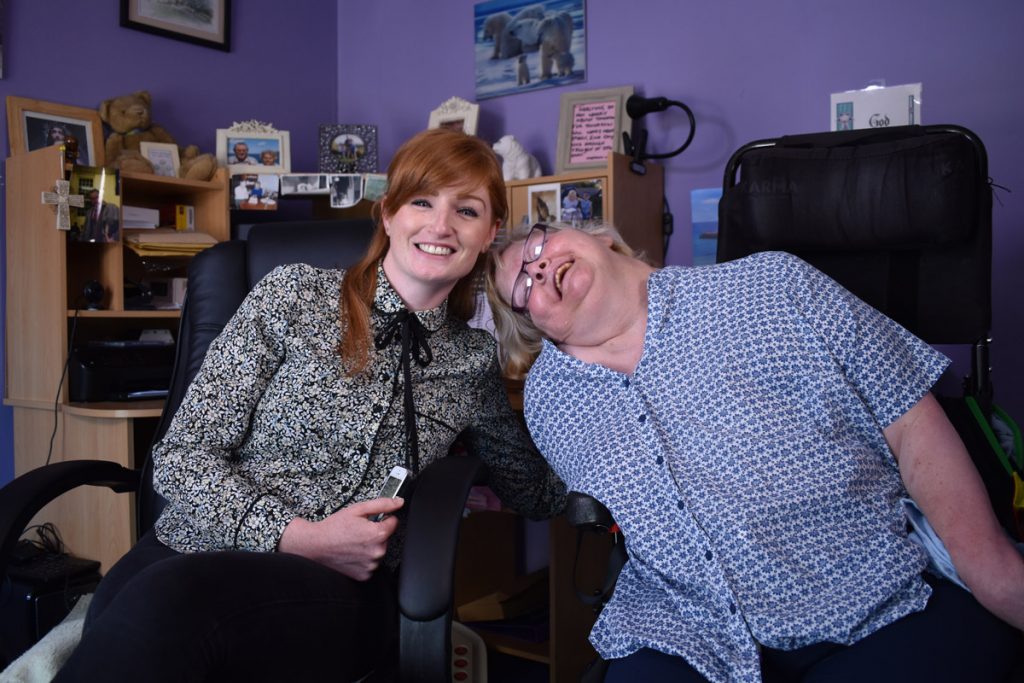
If you have any questions about the Photo of the Week series or the Research Photography Competition please email research@bournemouth.ac.uk
WeObserve launches its first online course: Citizen Science Projects – How to make a difference

WeObserve, in partnership with FutureLearn, introduces its first online course, Citizen Science Projects: How to make a difference. The course starts on 18 November 2019 and will run for four-weeks. It is open to anyone and is free to participate. The course is now open for registration on the FutureLearn platform here.
During the course, learners will be able to discover citizen science projects and find out how to create and lead their own citizen observatory. Citizen science experts will share their knowledge, experiences and best practices in delivering citizen science projects. The course will also support co-creation and shared learning through discussion forums and group activities.
Exploring a diverse range of citizen science topics including:
- Understanding the issue or problem: exploring environmental issues, deciding on a researh focus and defining the research question(s).
- Creating a community: finding the people who are brought together by a shared concern and positively nurturing the sharing of ideas and experiences.
- Deciding what data to collect: using the research question(s) to select what information will be gathered.
- Capturing or generating the data: collecting the information, keeping motivated and engaged.
- Analysing the data: interpreting the data, being able to spot trends and anomalies.
- Disseminating results: using the findings from the data to communicate with others about the environmental concern.
- Change-making and planning action: using the findings to lobby for change, or plan an intervention or action to inform others about the environmental concern.
Through this course, the aim is to build an international community of learners that will explore what is citizen science, what are citizen observatories, which tools they can use and where to find them, how to plan and conduct a data collection campaign, and how they can act.
This a great opportunity to reach an audience of DIY Citizen Scientists interested in taking action in their own communities, or researchers interested in the Citizen Science method.
For more information please contact Adam Morris – Engagement Officer
Last chance to book your free tickets for the ESRC Festival of Social Science!
 With only a few days to go before we kick off this year’s ESRC Festival of Social Science, don’t miss out on booking your free tickets!!
With only a few days to go before we kick off this year’s ESRC Festival of Social Science, don’t miss out on booking your free tickets!!
This year we’re exploring a number of different issues through a series of talks, interactive workshops, discussions and exhibitions. These events are aimed at a wide range of audiences to share understanding and spark conversations that can make a difference to society.
Come and join us to gain a fascinating insight into some of the social science research taking place at Bournemouth University and find out how we’re helping to understand and shape society.
Living your best life: positivity for wellbeing
Saturday 2 November: 9:30am -12:30pm
Lighthouse, 21 Kingland Road, Poole, BH15 1UG
With a rise in reported mental health issues amongst the general population, it is important to understand how each of us can take steps to develop our own self-awareness and socio-emotional intelligence. In this event we’ll turn the latest social science research into wellbeing tips and self-care strategies you can adopt in our own life, to develop your confidence and a better understanding of your emotional experiences.
Ways of seeing sport coaching violence
Monday 4 November: 6 – 8pm
Bournemouth University, Talbot Campus
Abuse, intimidation and violence in sport and coaching remain a significant global problem. Drawing on academic research and real life accounts of coach-athlete related violence, this event offers sport coaches, practitioners and others interested in this issue a unique and innovative opportunity to engage with research through an arts-based, audio-visual installation. You’ll also be able to chat to the researchers and share your experiences and views on developing positive coaching practice.
Trauma-informed health and social care
Tuesday 5 November: 9am – 4pm
The Shelley Theatre, Beechwood Avenue, Bournemouth, BH5 1LX
Trauma informed care is a new way of supporting the wellbeing of individuals who are experiencing, or have experienced childhood adversity or trauma. Using the World Café format, we will bring together those who work with people in a supportive role, for example teachers, care workers and social workers, to exchange ideas, learn from each other and develop new strategies. We’ll also feature talks from service users and expert practitioners, as well as workshop activities.
Hidden stories of online gamblers
Tuesday 5 November: 7:30 – 9pm and all week, online
Cafe Boscanova, Boscombe BH1 4BP
Visit our virtual exhibition, where we’ll share the diverse stories and voices of those affected by online gambling. Attend our Cafe Scientifique discussion in person or watch online to enjoy talks to discover the artificial intelligence, targeted advertising and behavioural science that keeps gamblers hooked and how you can beat them. Join the conversation by sharing your views and stories on social media.
Stress and wellbeing in the workplace
Wednesday 6 November: 10am – 4pm
Executive Business Centre, Holdenhurst Road, Bournemouth BH8 8EB
There is growing recognition that experiencing stress and trauma at work can have a hugely detrimental effect on your wellbeing. This event brings together academic researchers, staff from key agencies and the public to discuss research on stress and workplace trauma, and the best ways of tackling it. There will an opportunity to try out a range of self-care, relaxation and coping techniques as part of the event.
Preparing Gen Z for the global workplace
Wednesday 6 November: 3 – 5:30pm
Bournemouth University, Talbot Campus
It’s more important than ever that we equip our 21st century learners with the skills they need to thrive in the global workplace. This event, for further education teachers and tutors will teach you how to deliver a suite of workshops developed at Bournemouth University. We will run through the workshops in small interactive groups, and you will be provided with all the materials required to adapt these workshops for your own work with young people.
How we think about pregnancy and childbirth
Friday 8 November: 5:30 – 6:30pm
Poole Hospital, Longfleet Road, Poole BH15 2JB
This event looks at different perspectives on pregnancy – from the social model of pregnancy, which accepts childbirth as a normal event in a woman’s life to the medical model, which portrays childbirth as potentially dangerous to health. We’ll also discuss how understanding key models of pregnancy and childbirth could help politicians, journalists, healthcare professionals, pregnant women and new mothers put issues around ‘normal birth’ into perspective
Friday 8 November: 6 – 8pm
South Coast Roast, Richmond Hill, Bournemouth BH2 6EJ
News stories highlight the power of influencers to drive overspending, overconsumption, fast fashion and to erode self-confidence. But is there a better way? Join local influencers and experts from Bournemouth University for a relaxed event with talks and workshops. We’ll talk about how to post responsibly, how to understand your own behaviour and identity, and the power dynamics between influencers and followers. What’s more – we’ll learn how influencers can make the world a better place.
Saturday 9 November: 10am – 3pm
Executive Business Centre, Holdenhurst Road, Bournemouth BH8 8EB
This event will discuss the role of the media in suicide prevention, and the impact it can have on those suffering from bereavement and working in the field of suicide prevention. Join Bournemouth University academic Dr Ann Luce, along with people with experience of suicide, members of the Mental Health Forum, the Wellbeing and Recovery Partnership and the NHS. The event will feature talks and a discussion, with peer counsellors on hand to support you.
For more information about any of these events please contact; publicengagement@bournemouth.ac.uk
BU Academic Targeted Research Scheme – closing date soon
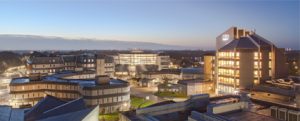 In recognition of the important contribution that early career academics play in driving research for the future, we are delighted to continue the BU Academic Targeted Research scheme to attract and recruit talented individuals in targeted research areas. Following the successful recruitment of three new posts, we will employ up to another three new Senior Lecturers with significant postdoctoral expertise (or of comparable experience) with outstanding potential in alignment with one of three targeted research areas:
In recognition of the important contribution that early career academics play in driving research for the future, we are delighted to continue the BU Academic Targeted Research scheme to attract and recruit talented individuals in targeted research areas. Following the successful recruitment of three new posts, we will employ up to another three new Senior Lecturers with significant postdoctoral expertise (or of comparable experience) with outstanding potential in alignment with one of three targeted research areas:
- Technology for behavioural change
- Sustainability, consumption and impact
- Sport and Sustainability
We wish to recruit a diverse cohort of individuals with the motivation to become future academic leaders in their field. As an academic at BU, successful candidates will develop their career in exciting work environments, be provided with a high level of dedicated time to drive research activity and build capacity, and have the freedom to develop their research interests within the targeted areas. BU is committed to Fusion and as such successful candidates will also have the opportunity to contribute to the education and professional practice activities within their Department.
To support these roles and accelerate their careers, BU will provide three years of full-time salary (or part-time equivalent) and reasonable costs directly related to the proposed programme of research activities (up to £10k per year). The standard Academic Application Form must be completed and in all cases accompanied by the BU Academic Targeted Research scheme application form, which will propose the research activities and request funding.
To find out more about these exciting opportunities, please read the scheme guidance and visit the BU website.
The deadline for applications is Monday 4 November.
Any enquiries should be directed to researchfellowships@bournemouth.ac.uk.
Photo of the week: ‘The Place: A health and fitness shop’
Telling a story of research through photography
The ‘photo of the week’ is a weekly series featuring photographs taken by BU academics and students for our Research Photography Competition which took place earlier this year.
These provide a snapshot into some of the incredible research taking place across the BU community.
This week’s photo of the week was taken by PhD Student Orlanda Harvey and is titled;
‘The Place: A health and fitness shop’
‘The placement of this model of the Incredible Hulk outside a health and gym store embodies one of the initial findings from my research. Part of my exploration into the experiences of men who use Anabolic Androgenic Steroids (AAS) evidences that one driver for building muscle is the link between muscularity and masculinity. Interviewees referenced the influence of social media images and ‘ripped’ celebrities as a reason for the current increase in use of AAS for recreational purposes and others talked about the muscular physique as being ‘what women want’.
‘Using hyper-muscular images, such as the Incredible Hulk to encourage people to purchase supplements, which have been found to illegally include AAS (Evans-Brown et al. 2012). This is tapping into the trend for men to have increasingly muscular physiques. This trend is seeping into western cultural norms and has influenced the design of toys, e.g. the chest sizes of G.I. Joe and Barbie’s Ken (Brownell and Napolitano 1995, Pope Jr. et al. 2016) have significantly increased, unrepresentative of achievable norm. Men, like women, are bombarded with unrealistic images of body shape, which could encourage some to take potentially risky routes such as using AAS to try to achieve the ‘ideal’.

If you have any questions about the Photo of the Week series or the Research Photography Competition please email research@bournemouth.ac.uk
RKEDF – Research Training in November

We have some great events coming up over the next few weeks to support you in your research activities.
November
| Tuesday 5th November | RKEDF: Clinical Research- documentation and filing |
| Wednesday 6th November | RKEDF: Research Outputs – Writing Day |
| Wednesday 13th November | RKEDF: EndNote Desktop for Managing References and Writing for Publication |
| Monday 18th November | RKEDF: UKRO Visit |
| Tuesday 19th November | RKEDF: Environment Narrative Day |
| Tuesday 19th November | RKEDF: Advanced Literature Search Techniques |
| Tuesday 19th November | RKEDF: Working with Industry |
| Tuesday 19th November | RKEDF: Building Evidence for REF Impact Case Studies |
| Tuesday 19th November | RKEDF Impact Planning Session |
| Wednesday 20th November | RKEDF: Inspirational Impact Journey |
| Wednesday 20th November | RKEDF: Leverhulme Trust Visit to BU |
| Tuesday 26th November | RKEDF: Evaluation: Developing your approach |
| Wednesday 27th November | RKEDF: Measuring the Impact of Your Research with Advanced Citation Tools. |
You can see all the Organisational Development and RKEDF events in one place on the handy calendar of events.
Please note that all sessions are now targeted, so look closely at the event page to ensure that the event is suitable for you. In addition, most RKEDF events now require the approval of your Head of Department (or other nominated approver). Please follow the instructions given on the event page and the template email for you to initiate the booking request.
If you have any queries, please get in touch!
Talk/session with the Wessex Clinical Research Network Study Support Service
The National Institute for Health Research (NIHR) is the nation’s largest funder of health and care research – the NIHR oversee 15 Clinical Research Networks (CRN) and these CRNs work alongside NHS Trusts, primary care providers and Universities. Each CRN has a dedicated Study Support Service.
The NIHR have a portfolio of research studies that are eligible for consideration for support from the CRN in England. Portfolio status is usually vital to participating NHS Trusts when considering undertaking a proposed study.
Information on the NIHR portfolio is present on the research blog, but at this session our local CRN’s Study Support team will provide you with an opportunity to hear about and discuss the network and the service, and how it could benefit you.
This session is aimed at those planning on conducting clinical research.
It is also designed to raise awareness at BU about the benefits and importance of the NIHR portfolio, so if you’re just interested in learning more, please book on.
The session will take place on Tuesday 10th December at 2:3opm until 4:00pm on Lansdowne Campus.
To register your interest or if you have any queries, please get in touch with Research Ethics.
Academia is becoming more demanding
Academia has become more demanding than twenty years ago, particularly, the job outwith university. Just this morning I received three requests to review a paper. Each from a very reputable journal and a each a legitimate requests, i.e. I asking me to assess a paper in a my academic field. 
Reviewing papers and grant applications is, of course, part of my academic responsibilities, and hence part of my scholarly practice. But I am already reviewing five NIHR (National Institute for Health Research) grant applications this weekend, as well as an other paper for BMC Pregnancy & Childbirth, and there are two PhD theses next my bed which I need to exam. On top of this I have been ignoring several reminder invitations to review a research proposal for the Croatian Science Foundation, as I simply do not have time to do so, however, much I would like to do so.
 The forthcoming REF 2021 is not helping. UK academics are frantically submitting their manuscripts to academic journals to have them in print before the end of 2020, to beat the REF 2021 deadline. The flip-side of this reviewing coin is that my collaborators and I have had three papers turned down in the past year by a reputable journal as it could not find appropriate reviewers. Three articles on three very different aspects of our work, one a UK-based study, one a European study and one a study based in Nepal. For two of these manuscripts the journal took nearly a year to come back to us, wasting the chance to submit the paper elsewhere.
The forthcoming REF 2021 is not helping. UK academics are frantically submitting their manuscripts to academic journals to have them in print before the end of 2020, to beat the REF 2021 deadline. The flip-side of this reviewing coin is that my collaborators and I have had three papers turned down in the past year by a reputable journal as it could not find appropriate reviewers. Three articles on three very different aspects of our work, one a UK-based study, one a European study and one a study based in Nepal. For two of these manuscripts the journal took nearly a year to come back to us, wasting the chance to submit the paper elsewhere.
Perhaps it is due the rose-tinted spectacles of looking at the past, perhaps is it simply my level of seniority (compared to twenty years ago) but I don’t think so. The underlying trend is that the volume of papers submitted to journals is growing faster than the number of academics volunteering to review. This blog is, therefor, also a call for my academic colleagues to step up and agree to review on (extra) paper. Interestingly, I made a not dissimilar call in a BU Research Blog eight years ago! Unfortunately, the overall situation has not improved.
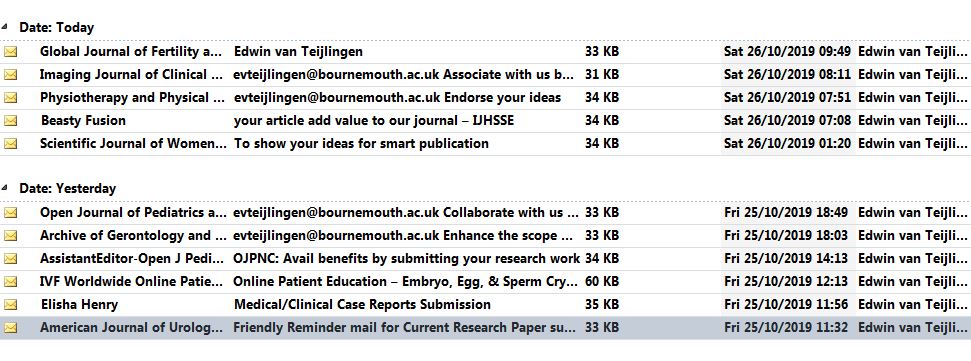 I haven’t even mentioned the exponential growth in email requests to academics submit papers to so-called predatory journals! I counted 15 requests in the past two days alone and it is only 10 AM on Saturday morning so more to follow later today.
I haven’t even mentioned the exponential growth in email requests to academics submit papers to so-called predatory journals! I counted 15 requests in the past two days alone and it is only 10 AM on Saturday morning so more to follow later today.
Prof. Edwin van Teijlingen
CMMPH
New report highlights how NIHR support for clinical research benefits the UK economy and NHS
The National Institute for Health Research (NIHR) is the nation’s largest funder of health research and offer support to NHS Trusts, researchers, universities and any other organisation conducting clinical research.
A recent report shows that the support given by the NIHR via their Clinical Research Networks (CRN) generated an estimated £8 billion of gross value added (GVA) to the NHS, over the last 3 years. The support also generated 47,467 full time equivalent jobs for the UK.
Other key findings from the report include:
Over the three year period (financial years) 2016/17 to 2018/19:
- The estimated annual economic contribution of NIHR CRN supported studies increased by £0.1 billion (GVA) between 2016/17 and 2018/19 (up from £2.6 billion in financial year 2016/17, to £2.7 billion in financial year 2018/19) – linked to increased commercial contract research activity supported by the NIHR CRN
- For each patient recruited onto a commercially-funded trial supported by the NIHR CRN, on average NHS providers in England received an estimated £9,200 from life sciences companies, and on average saved an estimated £5,800 per patient (where trial drugs replaced the standard treatment)
- The number of studies and patients recruited onto NIHR CRN supported studies have both increased by approximately 30% in three years (financial year 2016/17 – financial year 2018/19)
There was also a cost saving to the NHS of £28.6 million where trial drugs were provided and use in place of standard drugs.
You can view the NIHR article here and the full report here.
As taken from the article, Matt Cooper, Business Development and Marketing Director at the NIHR Clinical Research Network said:
“The benefits to the UK of a strong and productive NIHR Clinical Research Network, working in partnership with the NHS, are clearly demonstrated in this report. It describes sustained growth in the Clinical Research Network Portfolio of both clinical research and its value to the UK economy – £2.7billion in 2018/19, an increase of £300million from the previous report in 2016.”
Remember – support is on offer at BU if you are thinking of introducing your research ideas into the NHS – email the Research Ethics mailbox, and take a look at the Clinical Governance blog.
Photo of the Week: ‘Cost-effective and energy-efficient solution for smart cities’
Telling a story of research through photography
The ‘photo of the week’ is a weekly series featuring photographs taken by BU academics and students for our Research Photography Competition which took place earlier this year.
These provide a snapshot into some of the incredible research taking place across the BU community.
This week’s photo of the week was taken by Neetesh Saxena and is titled;
‘Cost-effective and energy-efficient solution for smart cities’
This image focuses on the solar and wind energy, which can be utilised in the upcoming smart cities to make the system more efficient, self-manageable, and optimised resourced, and also a cost-effective and mostly available energy resource for the smart devices.
Neetesh Saxena’s research focuses on the system’s efficiency and security aspects.
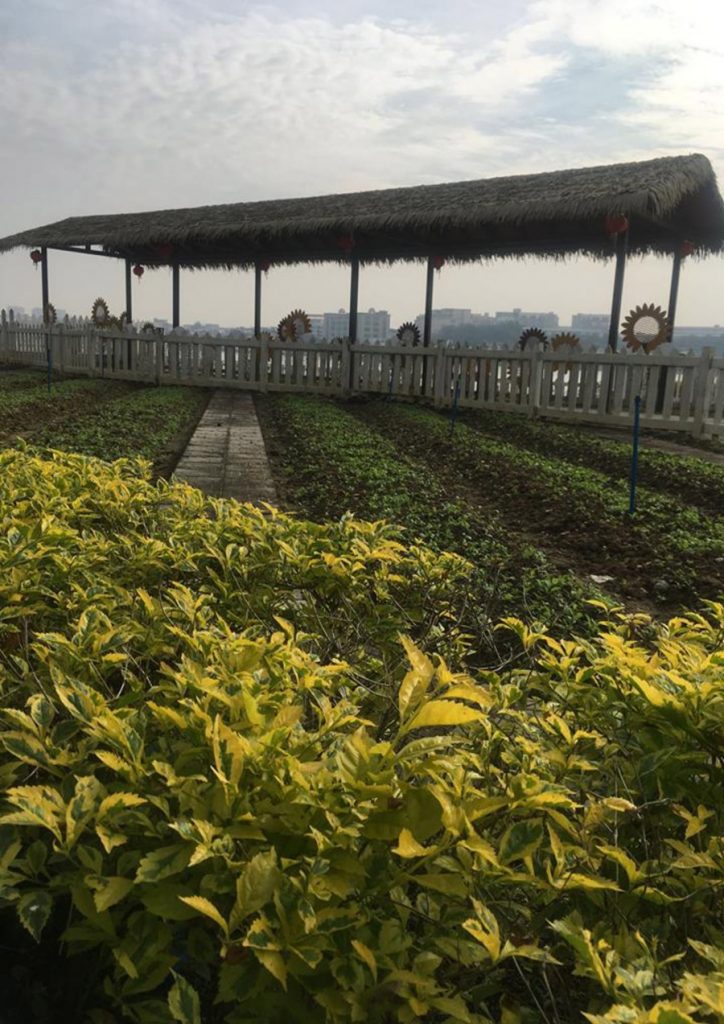
If you have any questions about the Photo of the Week series or the Research Photography Competition please email research@bournemouth.ac.uk
UKRO Visit (and Brexit)
 As usual, RDS will host an annual UK Research Office visit to BU in 2019. This year’s event has been scheduled for November; the reason is obvious – Brexit!
As usual, RDS will host an annual UK Research Office visit to BU in 2019. This year’s event has been scheduled for November; the reason is obvious – Brexit!
All academic staff interested in EU funding are invited to attend the event:
Monday 18th November Fusion Building – FG06 from 11:00 – 14:30. Lunch will be included.
Dr Andreas Kontogeorgos, European Advisor of the UK Research Office will be discussing with us the impact of Brexit on EU funding opportunities. Academics are welcome to submit any other EU funding related topics for discussion to Ainar Blaudums by the end of October.
UKRO delivers subscription-based advisory service for research organisations and provides MSCA and ERC National Contact Point services in the UK. As part of UKRO services, BU members of staff may sign up to receive personalised email alerts and get early access to EU funding related publications on UKRO portal.
Please contact Organisational Development to book a place.
BU Academic Targeted Research Scheme
 In recognition of the important contribution that early career academics play in driving research for the future, we are delighted to continue the BU Academic Targeted Research scheme to attract and recruit talented individuals in targeted research areas. Following the successful recruitment of three new posts, we will employ up to another three new Senior Lecturers with significant postdoctoral expertise (or of comparable experience) with outstanding potential in alignment with one of three targeted research areas:
In recognition of the important contribution that early career academics play in driving research for the future, we are delighted to continue the BU Academic Targeted Research scheme to attract and recruit talented individuals in targeted research areas. Following the successful recruitment of three new posts, we will employ up to another three new Senior Lecturers with significant postdoctoral expertise (or of comparable experience) with outstanding potential in alignment with one of three targeted research areas:
- Technology for behavioural change
- Sustainability, consumption and impact
- Sport and Sustainability
We wish to recruit a diverse cohort of individuals with the motivation to become future academic leaders in their field. As an academic at BU, successful candidates will develop their career in exciting work environments, be provided with a high level of dedicated time to drive research activity and build capacity, and have the freedom to develop their research interests within the targeted areas. BU is committed to Fusion and as such successful candidates will also have the opportunity to contribute to the education and professional practice activities within their Department.
To support these roles and accelerate their careers, BU will provide three years of full-time salary (or part-time equivalent) and reasonable costs directly related to the proposed programme of research activities (up to £10k per year). The standard Academic Application Form must be completed and in all cases accompanied by the BU Academic Targeted Research scheme application form, which will propose the research activities and request funding.
To find out more about these exciting opportunities, please read the scheme guidance and visit the BU website.
The deadline for applications is Monday 4 November.
Any enquiries should be directed to researchfellowships@bournemouth.ac.uk.
Doctoral College Newsletter | October 2019
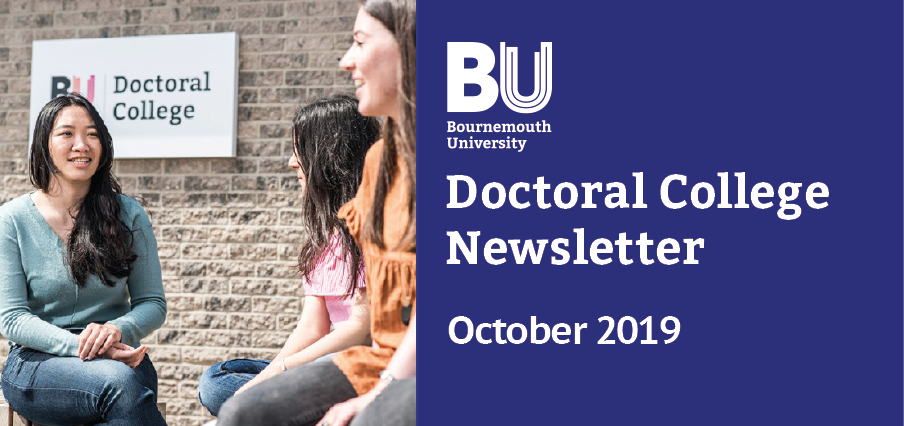
The Doctoral College Newsletter provides termly information and updates to all those involved with postgraduate research at BU. The latest edition is now available to download here. Click on the web-links provided to learn more about the news, events and opportunities that may interest you.
If you would like to make a contribution to future newsletters, please contact the Doctoral College.
New Sociology and Development publication
Congratulations to Professors Sara Ashencaen Crabtree and Jonathen Parker in the Faculty of Health & Social Sciences on the recent publication of their paper ‘‘Behaving like a Jakun!’ A case study of conflict, ‘othering’ and indigenous knowledge in the Orang Asli of Tasik Chini’ in the Journal of Sociology and Development [1]. This paper reports on an ethnographic study of the indigenous Jakun Orang Asli in West Malaysia. 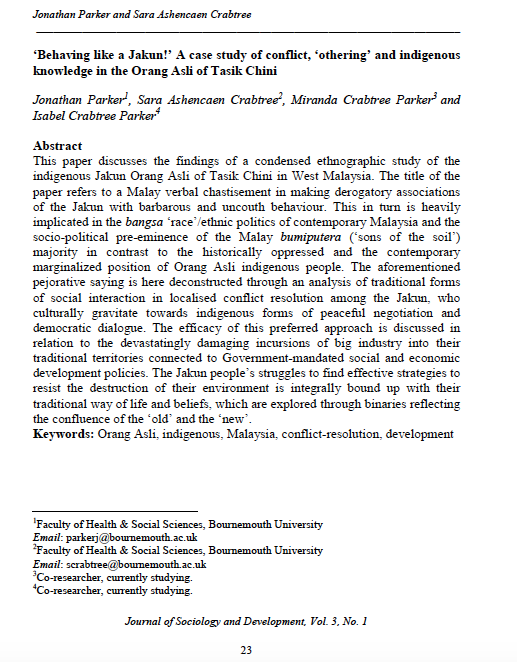
Congratulations!
Prof. Edwin van Teijlingen
CMMPH
Reference:
- Parker, J., Ashencaen Crabtree, S., Crabtree Parker, M., Crabtree Parker, I., 2019. ‘Behaving like a Jakun!’ A case study of conflict, ‘othering’ and indigenous knowledge in the Orang Asli of Tasik Chini. Journal of Sociology & Development, 3 (1):23-32.
Cafe Scientifique – Tuesday 5 November: Hidden stories of online gamblers

Café Scientifique takes place on the first Tuesday evening of the month at Café Boscanova
Enjoy listening to a short talk from our guest speaker before engaging in debate and discussion around that topic.
We’ll be joined by Dr Elvira Bolat & Dr Emily Arden-Close on Tuesday 5 November from 7:30pm until 9pm (doors open at 6:30pm) No need to register, make sure you get there early though as seats fill up fast!
Hidden stories of online gamblers
The stereotype of the problem gambler no longer holds true – digital connectivity means we are all now exposed to online gambling and the risk of addiction. Join researchers from BU to discover how platforms use artificial intelligence, targeted advertising and behavioural science to keep gamblers hooked – and how you can avoid falling prey to these tools.
If you have any questions please do get in touch
Find out more about Café Scientifique and sign up to our mailing list to hear about other research events: www.bournemouth.ac.uk/cafe-sci
You can also follow us on Facebook and Twitter
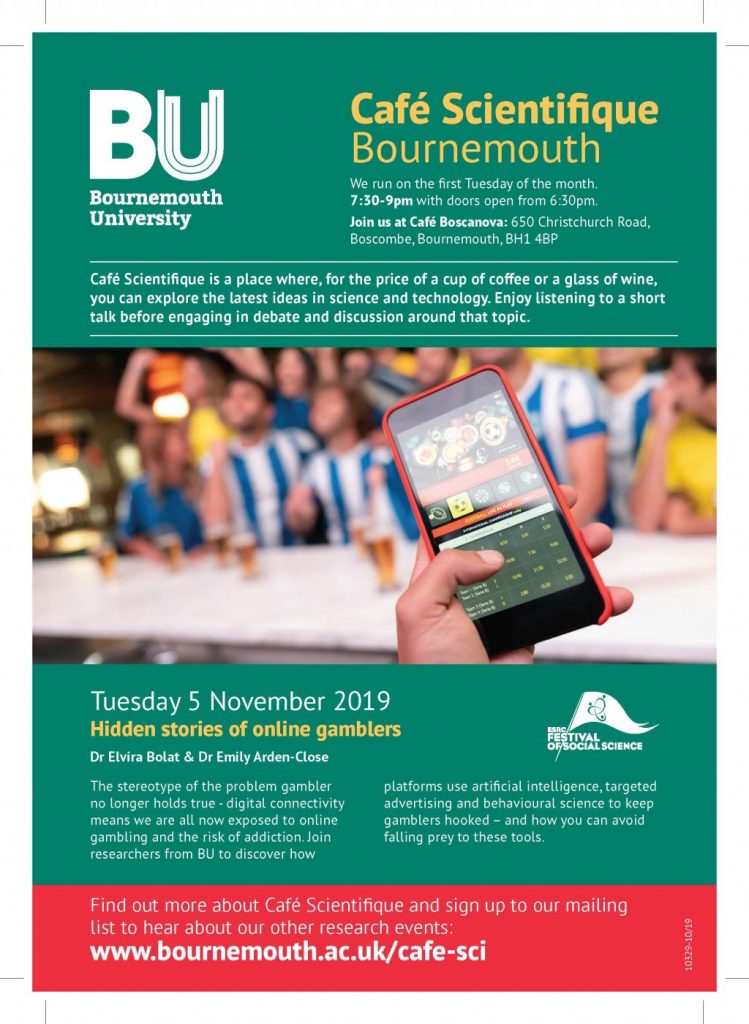
Research Training Events – Coming Up at BU

Looking to enhance your career as an academic researcher ?
Here are some great RKEDF training events coming up in the next fortnight.
Tuesday 15th Oct 10:00 – 12:00 Good Clinical Practice ‘Lite’ – helping you to maintain essential standards for conducting clinical research.
Wednesday 16th Oct 10:00 – 12:00 Getting Started in Public Engagement – essential for disseminating your research findings.
Thursday 17th Oct 16:00 – 17:00 BRIAN – Building Your Staff Profile – a key tool for networking and managing your research output.
Monday 21st Oct 09:00 – 13:00 High Quality Public Engagement – for those experienced in public engagement who want to step up to the next level.
Monday 21st Oct 15:00 – 17:00 ACORN Pre-Application Workshop – for those ECRs who wish to apply for internal ACORN funding.
Thursday 24th Oct 09:30 – 13:00 GCRF Best Practice Workshop – for those with Global Challenge Research Fund experience and those who want to apply.
Thursday 24th Oct 10:00 – 12:00 Overview of NIHR, CRNs, and NIHR Portfolio – find out more about nation’s largest funder of health and care research.
Follow the links for more information and to book.
Checkout the full range of possible events via the RKEDF or by date using the OD Event Calendar.





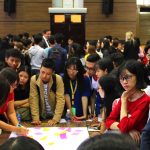














 Upcoming opportunities for PGRs – collaborate externally
Upcoming opportunities for PGRs – collaborate externally BU involved in new MRF dissemination grant
BU involved in new MRF dissemination grant New COVID-19 publication
New COVID-19 publication Conversation article: London Marathon – how visually impaired people run
Conversation article: London Marathon – how visually impaired people run MSCA Postdoctoral Fellowships 2024
MSCA Postdoctoral Fellowships 2024 Horizon Europe News – December 2023
Horizon Europe News – December 2023